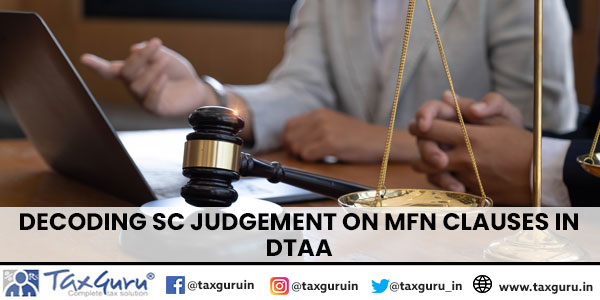Decoding SC Judgement on MFN Clauses in DTAA in the case of Assessing Officer Circle (International Taxation) Vs Nestle SA (Supreme Court), Civil Appeal No(S). 1420 of 2023, Dated: 19/10/2023
Introduction: Understanding the intricacies of Most Favoured Nation (MFN) clauses in Double Taxation Avoidance Agreements (DTAA) is paramount in navigating international tax treaties. These clauses ensure equitable tax treatment among treaty partners, vital for preventing double taxation and fostering fair economic relations. In the wake of a recent Supreme Court judgment on MFN clauses in India’s tax treaties, it becomes imperative to dissect its implications. This article aims to elucidate the fundamentals of MFN clauses, contextualize their significance within DTAA frameworks, and critically analyze the Supreme Court’s ruling, providing insights into its ramifications for taxpayers and tax authorities alike.
1. Understanding The Basics:
A. What is MFN Clause?
In the context of tax treaties, “MFN” stands for “Most Favoured Nation”. Similar to trade agreements, a Most Favoured Nation clause in a tax treaty ensures that one country grants to the other the same favourable tax treatment that it provides to its most favoured partner. In the realm of tax treaties, this means that if a country (Country A) enters into a tax treaty with another country (Country B) and subsequently negotiates a more favourable tax provision with a third country (Country C), then Country A is obligated to extend those more favourable provisions to Country B through the Most Favoured Nation clause. The inclusion of Most Favoured Nation clauses in tax treaties aims to promote fairness and prevent tax discrimination.
B. What is DTAA?
In short, DTAA stands for Double Taxation Avoidance Agreement. It is an agreement between two countries aimed at preventing taxpayers from being taxed on the same income in both countries, thus avoiding double taxation. DTAA outlines the rules for taxing different types of income and provides mechanisms to resolve conflicts in taxing jurisdiction between the two countries.
2. Setting Context To The Issue Involved
India had entered into DTAAs with a few countries like Netherlands, France, and Switzerland which included MFN clauses, giving these countries MFN Status. These clauses stated that if India entered into a DTAA with a third country that provided a lower tax rate on dividend income than the rate in the DTAA with the MFN country (i.e. Netherlands, France, Switzerland), the residents of the MFN country would also be entitled to the lower rate of tax on such income.

India subsequently entered into DTAAs with Slovenia, Lithuania, and Colombia, that provided a lower tax rate on dividend income. However, these countries were not members of the Organization for Economic Cooperation and Development (OECD) at the time of signing the DTAAs.
This leads us to a question to ponder whether the lower tax rates mentioned in DTAA with Slovenia, Lithuania, Columbia will trigger the DTAA with Netherlands, France, Switzerland by virtue of invocation of MFN Clause. Whether the MFN residents were eligible for lower tax rate on dividend was the matter of debate.
3. Decision Of The High Court
Case Law: Concentrix Services Netherlands B.V. v. Income Tax Officer (TDS) (Delhi High Court) and Nestle SA v. Assessing Officer (Delhi High Court)
- OECD Membership: The Delhi High Court held that MFN clause was triggered even if India entered into DTAA with other countries prior to their membership in OECD. This means MFN clause was triggered irrespective of OECD Membership status of such countries.
- Government Notification: No separate notification of the Government was required giving effect to MFN Clause in the DTAA of MFN countries.
The Tax Authorities filed an appeal in this regard against decision of Delhi High Court to the Supreme Court.
4. Decision Of The Supreme Court
- OECD Membership
MFN Clause shall be triggered only when the third country is a member of OECD at the time of entering into DTAA with India. Only then MFN Countries can be benefitted by lower tax rates or lower scope of income offered to the third country by India.
A crucial point to note here is that, the DTAA specifies the words ‘is a member’ which means that the third country should already be a member of OECD at the time of entering into DTAA with India. The Supreme Court has adopted a precise application and a rigorous construal of law.
- Government Notification:
A separate notification of the Government u/s 90 is required to give effect to the MFN Clause. Any change in DTAA requires Parliamentary action. This has been the customary legal and constitutional procedure which ought not to be hampered.
5. Conclusion
Essentially, the ruling stipulated the need for a distinct notification to trigger the MFN clause and underscored that the third country must be a member of the OECD at the moment of signing the DTAA for the MFN clause to take effect.
6. Criticisms
Detractors have contended that the Court neglected to apply the general interpretative principles outlined in the Vienna Convention on the Law of Treaties (VCLT), dismissed the intended goals of the MFN clauses, and embraced a restricted and literal construal of crucial terms. Critics argue that the Court’s introduction of an extra condition for government notification lacks foundation and contravenes the principle of treaty autonomy. Moreover, the verdict has introduced ambiguity and the potential for dual taxation.





